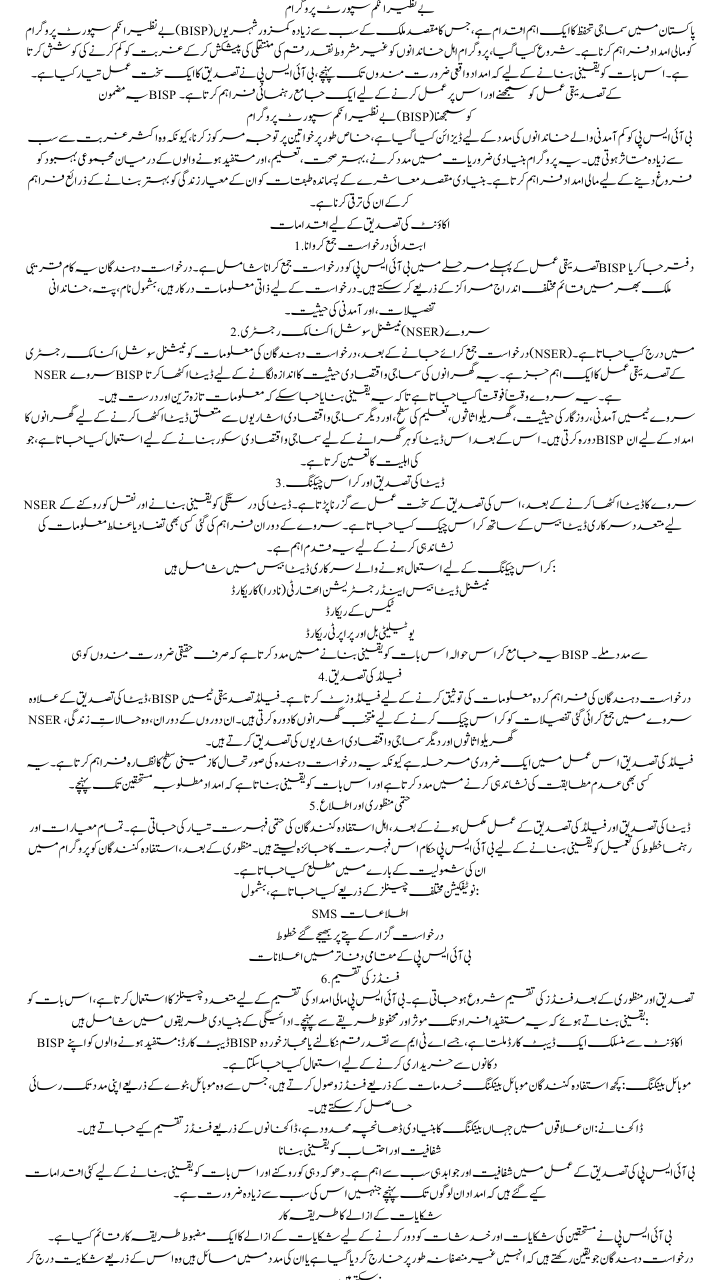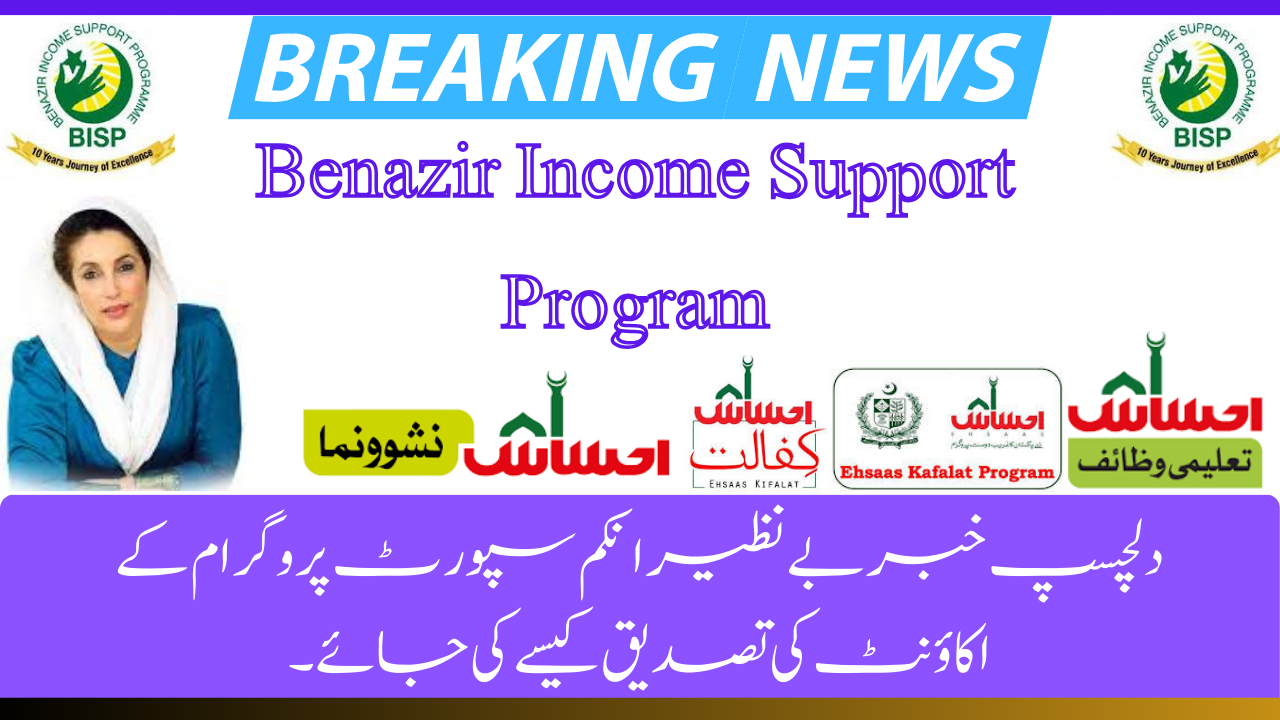Benazir Income Support Program
The Benazir Income Support Program (BISP) is a pivotal social safety net initiative in Pakistan, aimed at providing financial assistance to the country’s most vulnerable citizens. Launched, the program seeks to alleviate poverty by offering unconditional cash transfers to eligible families. To ensure that aid reaches those truly in need, BISP has developed a rigorous verification process. This article provides a comprehensive guide to understanding and navigating the verification process of BISP.
Understanding the Benazir Income Support Program (BISP)
BISP is designed to support low-income families, particularly focusing on women, as they are often the most affected by poverty. The program provides financial assistance to help with basic needs, promoting better health, education, and overall well-being among beneficiaries. The primary objective is to uplift marginalized segments of society by providing them with the means to improve their quality of life.
Steps for Account Verification
1. Initial Application Submission
The first step in the verification process involves submitting an application to BISP. Applicants can do this by visiting the nearest BISP office or through various enrollment centers established across the country. The application requires personal information, including name, address, family details, and income status.
2. National Socio-Economic Registry (NSER) Survey
Once the application is submitted, the applicant’s information is recorded in the National Socio-Economic Registry (NSER). The NSER survey is a crucial component of BISP’s verification process. It collects data on households to assess their socio-economic status. This survey is conducted periodically to ensure that the information is up-to-date and accurate.
The survey teams visit households to collect data on income, employment status, household assets, education level, and other socio-economic indicators. This data is then used to generate a socio-economic score for each household, determining their eligibility for BISP assistance.
3. Data Verification and Cross-Checking
After the NSER survey data is collected, it undergoes a rigorous verification process. The data is cross-checked with multiple government databases to ensure accuracy and prevent duplication. This step is crucial in identifying any discrepancies or false information that might have been provided during the survey.
Government databases used for cross-checking include:
- National Database and Registration Authority (NADRA) records
- Taxation records
- Utility bills and property records
This comprehensive cross-referencing helps ensure that only those genuinely in need receive assistance from BISP.
4. Field Verification
In addition to data verification, BISP conducts field visits to validate the information provided by applicants. Field verification teams visit selected households to cross-check the details submitted in the NSER survey. During these visits, they verify the living conditions, household assets, and other socio-economic indicators.
Field verification is an essential step in the process as it provides a ground-level view of the applicant’s situation. It helps identify any inconsistencies and ensures that the assistance reaches the intended beneficiaries.
5. Final Approval and Notification
Once the data verification and field verification processes are complete, the final list of eligible beneficiaries is prepared. This list is reviewed by BISP officials to ensure compliance with all criteria and guidelines. After approval, the beneficiaries are notified of their inclusion in the program.
Notification is done through various channels, including:
- SMS notifications
- Letters sent to the applicant’s address
- Announcements at local BISP offices
6. Disbursement of Funds
After verification and approval, the disbursement of funds begins. BISP uses multiple channels to distribute the financial assistance, ensuring it reaches the beneficiaries efficiently and securely. The primary modes of disbursement include:
- BISP Debit Card: Beneficiaries receive a debit card linked to their BISP account, which can be used to withdraw cash from ATMs or make purchases at authorized retail outlets.
- Mobile Banking: Some beneficiaries receive funds through mobile banking services, enabling them to access their assistance via mobile wallets.
- Post Offices: In areas where banking infrastructure is limited, funds are disbursed through post offices.
Ensuring Transparency and Accountability
Transparency and accountability are paramount in the BISP verification process. Several measures are in place to prevent fraud and ensure that assistance reaches those who need it most.
Grievance Redressal Mechanism
BISP has established a robust grievance redressal mechanism to address complaints and concerns from beneficiaries. Applicants who believe they have been unfairly excluded or have issues with their assistance can file a complaint through:

- BISP Helpline: A dedicated helpline to address queries and complaints.
- Online Portal: Beneficiaries can lodge complaints and track their status online.
- BISP Offices: Complaints can be submitted in person at BISP offices.
Third-Party Audits
To further enhance transparency, BISP undergoes regular third-party audits. Independent auditors assess the program’s implementation, including the verification process, fund disbursement, and overall impact. These audits help identify areas for improvement and ensure compliance with international best practices.
Conclusion
The verification process of the Benazir Income Support Program is a meticulously designed system aimed at ensuring that financial assistance reaches the most deserving families in Pakistan. By employing a multi-layered approach that includes data collection, cross-checking, field verification, and third-party audits, BISP maintains transparency, accountability, and efficiency. This comprehensive process not only helps uplift marginalized communities but also strengthens the overall social safety net in the country. Through continuous improvements and rigorous oversight, BISP strives to fulfill its mission of alleviating poverty and empowering the most vulnerable segments of society.
